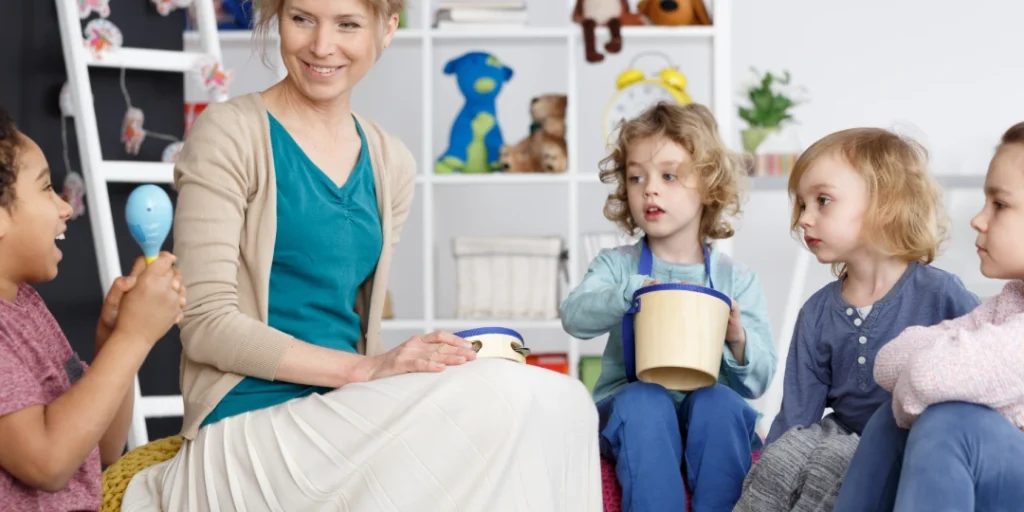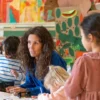![Play, Learn, Thrive: How Mt. Juliet Day School Prepares Young Learners for Lifelong Success Introduction: Building a Strong Foundation from the Start At Mt. Juliet Day School, the early years are recognized not as a mere transition into formal education, but as the bedrock […]](https://dayschools.org/mtjuliet/wp-content/uploads/sites/6/2025/05/Murfreesboro-Day-School-9.webp)
Table of Contents
Introduction: Building a Strong Foundation from the Start
At Mt. Juliet Day School, the early years are recognized not as a mere transition into formal education, but as the bedrock upon which all future learning is constructed. These are the formative years when a child’s neural pathways are rapidly developing, emotional patterns are taking shape, and foundational social behaviors are being modeled. The school treats this window of opportunity with precision and purpose, ensuring that each child is engaged in meaningful experiences that foster not only school readiness but lifelong adaptability, empathy, and curiosity.
Rather than rushing children toward academic benchmarks, Mt. Juliet Day School embraces a developmental approach that prioritizes the individual growth trajectory of each learner. In this nurturing environment, children are encouraged to explore freely, express themselves confidently, and evolve at a pace that respects their personal rhythm. Teachers craft learning experiences that ignite curiosity while supporting emotional regulation and interpersonal development. This commitment to nurturing the whole child is what distinguishes the school’s philosophy from more traditional models.
The physical and emotional climate of the school is intentionally designed to be both stimulating and secure. Classrooms are arranged to support autonomy and exploration, while maintaining the structure young children need to feel safe. From the welcoming morning routine to the reflective wind-down at day’s end, Mt. Juliet Day School is a place where children are genuinely known, celebrated, and empowered. This solid foundation enables students to enter each successive stage of life with a sense of confidence, competence, and intrinsic motivation to learn.
A Philosophy Rooted in Purposeful Play
Mt. Juliet Day School understands that play is not a departure from learning—it is the richest form of it. Grounded in developmental science, the school’s philosophy holds that through play, children construct meaning, solve problems, and internalize complex concepts naturally and joyfully. Whether guided or spontaneous, play is treated with the same seriousness as any other academic endeavor because it is through these activities that children become thinkers, inventors, and collaborators.
Purposeful play at Mt. Juliet Day School is intentionally integrated into every facet of the curriculum. When children build elaborate structures with blocks, they explore mathematical concepts such as symmetry, estimation, and balance. When they immerse themselves in role-playing as doctors, firefighters, or shopkeepers, they engage in storytelling, broaden their vocabulary, and refine their social skills. These activities are not merely imaginative—they are deeply instructional, providing children with the scaffolding to understand abstract ideas through concrete experiences.
What truly elevates this play-based approach is the role of the educator. Teachers at Mt. Juliet Day School are keen observers and strategic facilitators. They know when to step in and introduce a challenge, when to guide reflection with a thoughtful question, and when to simply let discovery unfold. Each play scenario becomes a layered experience, designed to stretch thinking, provoke dialogue, and reinforce learning objectives. This thoughtful orchestration ensures that play is not only joyful, but deeply purposeful, cultivating cognitive agility, emotional insight, and creative resilience in every child.

Igniting Intellectual Curiosity Through Exploration
At Mt. Juliet Day School, intellectual curiosity is not a passive trait—it is a cultivated disposition, nurtured with care and intention. The school believes that children are natural-born scientists, storytellers, and problem-solvers, and it structures each day to foster this intrinsic drive to understand the world. Rather than limiting young learners to static facts, the school encourages them to ask questions, test theories, and follow their wonder wherever it may lead.
Exploration takes many forms in the Mt. Juliet Day School classroom. Children might examine plant life under magnifying glasses, build rain collectors to track weather, or sort recycled materials as part of an environmental project. These hands-on, inquiry-based experiences transform learning into a living process—one where trial and error are embraced as steps toward deeper understanding. The curriculum is adaptive, allowing teachers to pivot in response to students’ emerging interests and extend those curiosities into interdisciplinary study.
This model of learning through exploration has lasting effects. Children not only retain knowledge more deeply, but also develop the critical thinking and reasoning skills that will serve them across academic domains and life experiences. They learn to pursue answers, tolerate ambiguity, and celebrate the process of discovery. At Mt. Juliet Day School, intellectual curiosity is not a fleeting moment—it becomes a lifelong habit of mind, anchored in the confidence that their questions matter and their investigations have value.
Emotional Development as a Cornerstone
Emotional intelligence is foundational to a child’s overall well-being and long-term success. Mt. Juliet Day School places this domain of development at the very heart of its educational philosophy. Children are taught not only to recognize their emotions but also to understand their causes, regulate their responses, and express themselves constructively. These skills are modeled, practiced, and reinforced in every corner of the classroom.
From morning greetings to conflict resolution during group play, emotional literacy is woven into daily routines. Educators use intentional language to name feelings, validate children’s experiences, and provide them with tools for coping and communication. A disagreement over a shared toy becomes an opportunity to practice negotiation and empathy. A moment of frustration is transformed into a guided reflection on problem-solving and self-control. These moments, while subtle, are monumental in shaping emotionally resilient individuals.
The nurturing environment at Mt. Juliet Day School ensures that children feel seen, heard, and supported in their emotional growth. Safe spaces within the classroom encourage self-regulation, while whole-group discussions build collective understanding and community responsibility. As a result, children develop a robust emotional vocabulary, a deep sense of empathy, and the social competencies necessary to build healthy relationships. Emotional development is not treated as supplemental—it is essential, setting the tone for academic success and personal fulfillment alike.
Structuring the Day for Balance and Growth
A well-balanced day provides young children with both the structure they crave and the freedom they need. Mt. Juliet Day School has carefully designed its daily schedule to reflect this equilibrium. Predictable routines provide a sense of safety and rhythm, while intentional flexibility ensures space for exploration, spontaneity, and joy. This structure supports children’s developing executive function and encourages healthy patterns of focus, engagement, and rest.
Each day is thoughtfully segmented into periods of active learning, creative play, group collaboration, and quiet reflection. Children might begin the morning with a group meeting to set intentions, followed by time in learning centers or outdoor play, then transition to a story circle or hands-on science project. Meal times and rest periods are respected not just as breaks, but as essential opportunities for social bonding and restoration. Every transition is managed with care, allowing children to move seamlessly and confidently through their day.
This balanced approach fosters more than academic success. It supports emotional regulation, builds stamina for concentration, and nurtures a sense of agency in young learners. Children learn to anticipate what comes next while feeling empowered to make choices within that framework. At Mt. Juliet Day School, the day’s structure becomes an invisible scaffold—one that uplifts creativity, strengthens resilience, and allows every child to thrive at their own developmental pace.

Curriculum That Connects Mind, Body, and Spirit
At Mt. Juliet Day School, the curriculum is a tapestry woven with intentional threads of academic rigor, creative exploration, physical activity, and social-emotional growth. It is not fragmented into disconnected subjects, but integrated holistically to reflect the interconnected nature of human development. The goal is not merely to educate children but to nourish their minds, strengthen their bodies, and uplift their spirits.
Children engage with math, literacy, and science not in isolation, but through thematic units that bring meaning and context to their learning. A unit on the seasons, for example, may include graphing weather patterns, reading stories about autumn, painting fall leaves, and journaling personal observations. This multidisciplinary approach deepens comprehension and promotes fluid thinking. Meanwhile, music, visual arts, and movement are not considered enrichment—they are essential avenues for expression, storytelling, and identity formation.
Physical and emotional wellness are also integral to the curriculum. Outdoor play, yoga, sensory integration, and mindfulness exercises are incorporated throughout the week. These practices support not only motor development and self-regulation but also teach children to listen to their bodies and care for their mental well-being. Mt. Juliet Day School views each child as a whole person—intellectually curious, emotionally rich, physically capable, and spiritually vibrant. Its curriculum ensures that every facet of the child is engaged and celebrated.
Teachers as Facilitators, Mentors, and Guides
The educators at Mt. Juliet Day School are the heart of its mission. More than instructors, they are facilitators of learning, mentors in growth, and trusted guides in each child’s journey. Their presence is purposeful and their role expansive—shaping not just what children learn, but how they experience learning. Each teacher brings a deep understanding of early childhood development, paired with a passion for creating meaningful relationships that foster security and enthusiasm.
These professionals observe children with a discerning eye, interpreting behaviors and interests as signals for instructional opportunity. A spontaneous question from a child may become the seed for a new group investigation. A quiet child’s artistic creation may lead to a conversation about storytelling and symbolism. Mt. Juliet Day School teachers are responsive and reflective, allowing the curriculum to evolve organically in response to the group’s dynamics and the individual’s needs.
Continuous professional growth is embedded in the school culture. Educators engage in peer collaboration, attend conferences, and participate in ongoing training to remain current with research-based practices. They are committed to refining their craft and deepening their impact. This dedication ensures that Mt. Juliet Day School’s classrooms are not only vibrant centers of learning but also places of profound connection and transformation. Each teacher plays a pivotal role in helping students grow into confident, competent, and compassionate learners.
Spaces That Stimulate Discovery and Wonder
At Mt. Juliet Day School, the learning environment is designed with the same intentionality as the curriculum. Every space is curated to promote independence, provoke inquiry, and inspire awe. The layout, lighting, textures, and materials all work in concert to create a classroom that invites exploration while offering comfort and security. It is an environment that speaks to children, encouraging them to engage with the world around them on their own terms.
Classrooms are organized into learning zones—each with a clear purpose yet open to interpretation by the child. A sensory table might hold sand one week and water the next, shifting with the season or topic of study. A quiet reading nook provides sanctuary for reflection, while an art station invites bold self-expression. Materials are accessible, natural, and open-ended—offering endless possibilities for experimentation and creation. Displays feature student work and documentation of learning processes, reinforcing a culture of value and visibility.
Outdoor spaces are treated not as recess but as extensions of the classroom. Children garden, collect natural objects, observe insects, and build structures from found materials. These interactions with nature support environmental stewardship, sensory integration, and unstructured imaginative play. Whether inside or out, the spaces at Mt. Juliet Day School are designed to mirror its educational values: curiosity, respect, discovery, and joy. In these thoughtfully arranged environments, children feel empowered to take risks, explore freely, and find meaning in the world around them.
Partnering with Families for Deeper Impact
At Mt. Juliet Day School, education is viewed as a shared endeavor—one that thrives through collaboration between educators and families. Parents are not positioned as passive observers but as essential partners in their child’s developmental journey. The school actively cultivates strong, respectful relationships with each family, grounded in trust, communication, and shared purpose. This partnership enriches the child’s experience and extends the learning environment seamlessly into the home.
From the moment of enrollment, families are welcomed into the Mt. Juliet Day School community. Educators establish open channels of communication through regular updates, learning journals, parent-teacher conferences, and digital portfolios that showcase each child’s progress and milestones. These communications go beyond test results or behavior notes—they highlight growth in problem-solving, emotional intelligence, collaboration, and creativity. Parents are invited to share observations, goals, and insights, creating a dialogue that ensures the educational approach is aligned with each child’s needs.
Family engagement doesn’t end with communication—it is embedded in the culture of the school. Seasonal events, classroom volunteering, and learning celebrations offer opportunities for parents to participate meaningfully in their child’s school life. Workshops on early childhood development, literacy strategies, and emotional support provide valuable resources for families navigating parenting in a rapidly changing world. At Mt. Juliet Day School, when the school and family stand united, the child is surrounded by a circle of consistency, care, and encouragement—an ecosystem that fosters resilience, confidence, and thriving.

Assessing Progress in a Developmentally Meaningful Way
Assessment at Mt. Juliet Day School is a thoughtful, nuanced practice that respects the uniqueness of every child’s learning path. Rather than relying on standardized tests or rigid benchmarks, the school employs a comprehensive, observational-based approach that captures growth in context. Teachers track developmental progress across cognitive, social-emotional, language, and motor domains—constructing a multidimensional portrait of each learner over time.
Through daily observations, work samples, anecdotal records, and portfolio collections, educators gather rich data that reflects both the process and outcomes of learning. A drawing, a dramatic play scenario, or a conversation during group time might reveal a child’s conceptual understanding, expressive language, or emotional self-awareness. These insights are shared with families through narrative reports and collaborative goal-setting conversations, allowing parents to see the full spectrum of their child’s development—not just what they’ve mastered, but how they’ve grown.
Assessment is used not to label, but to inform. Teachers use what they observe to refine lesson planning, adapt learning environments, and provide differentiated support or enrichment. Children are included in reflective practices, helping them to notice their own growth and take pride in their progress. This approach fosters intrinsic motivation, self-awareness, and confidence. At Mt. Juliet Day School, assessment is not a tool for comparison—it is a compass for personalized, purposeful learning.
Conclusion: Nurturing the Whole Child for a Lifelong Journey
Mt. Juliet Day School is not merely a place where education begins—it is where the essence of lifelong learning is carefully and intentionally cultivated. Every facet of the school, from its purposeful play philosophy to its emotionally responsive curriculum and family-centered partnerships, is designed to honor the full complexity of childhood. Here, children are not hurried through checklists but are empowered to explore, reflect, connect, and grow at a pace that respects their individuality and potential.
What sets Mt. Juliet Day School apart is its unwavering commitment to the whole child. Academic learning is integrated with emotional intelligence, physical development, and social fluency. Children are guided to not only know and do—but to feel, relate, and wonder. They leave not just prepared for kindergarten, but equipped with the confidence, resilience, and empathy to succeed in any environment. These are the qualities that endure long after the preschool years—shaping the way a child engages with the world.
As families seek educational experiences that go beyond the conventional, Mt. Juliet Day School stands as a beacon of excellence and integrity. Its legacy is not found in test scores, but in the joyful voices, confident strides, and compassionate actions of its graduates. It is a place where learning is a journey, not a destination—and where every child is given the tools and trust to thrive on their own unique path.





